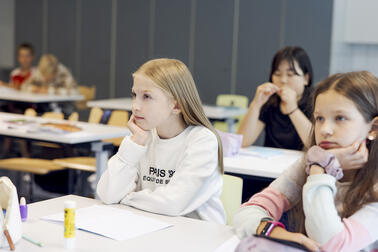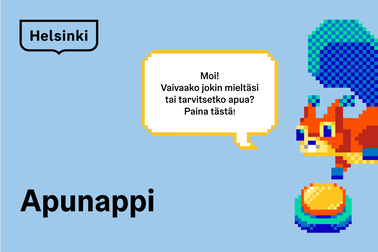
Seppänen feels that multiculturalism makes her work more colourful, more eventful and richer. It is important for an international educational institution to communicate that all students’ cultural and personal backgrounds are equally important. Two-way integration means that people moving to Finland from other countries are familiarised with Finnish society while simultaneously enabling native Finnish people to learn to take other cultures into consideration.
Safety is reinforced through shared values
Miia Seppänen stresses the importance of safety in students’ everyday life. The City of Helsinki has decided to systematically increase the sense of safety at its educational institutions by creating rules for a safe community.
“Our safe space workshops involve student welfare professionals. We emphasise that everyone is welcome to join in as they are. We are here for everyone”, Seppänen explains.
Safety is also supported through field work in classrooms. During a study day, the workers can talk with students about matters such as what it means for everyone to feel safe in the classroom.
“We challenge and engage young people to think about shared values and prevent harassment, racism and bullying. We also work towards promoting student welfare at the same time.”
Seppänen stresses that schools and educational institutions do not accept racism in any form. The staff have clear values, and they have been educated and informed on how wounding the impacts of racism can be.
Every student is an individual
Seppänen feels that it is important for workers to encounter every young person as an individual – no one is a stereotypical member of a group.
“The starting point for my work is individual freedom and freedom of self-determination.”
The majority of Seppänen’s work consists of personal work with students. She has access to interpretation services if needed, enabling everyone to talk about their emotions in their native language.

Seppänen is glad that seeing a psychologist is no longer a taboo. Her hope is that people can and do come for a chat before their problems increase and accumulate.
As a psychologist, Seppänen has noticed in her work that native Finns have a lower threshold to come see her than people who have moved in from other countries. Cultural background plays a major role – some languages do not even have words to describe depression.
Life management through learning civic skills
Increasing depression and anxiety among young people is a problem in Finland that has been observed through means such as school health surveys. The reasons for it are not entirely known. Seppänen says that young people who come to see her often have a bunch of different symptoms, the untangling of which reveals many deficiencies in life management skills. The psychologist goes through basics with the young person, discussing matters such as nutrition, sleep, physical activity and things that provide gratification.
Miia Seppänen’s view is that schools and educational institutions could have more elements that strengthen civic skills than they currently do. When a young person learns skills needed in everyday life, it also keeps their life management in check and increases their wellbeing.
Practical advice for everyday problems
Some students with an immigrant background may place more importance on family and community than people do on average in Finnish culture. On the one hand, the community supports the young person and gets them going. On the other hand, culture can also cause a young person to not be used to making their own decisions or taking care of everyday matters.
“Occasionally a student may need help with very practical matters, such as opening a bank account or acquiring a rental apartment.”
A young person’s life is constantly tumultuous, and the most intense years of change often take place at ages 16–19. The greater the young person’s capacity for resilience – i.e. tolerance for stress and internal flexibility – the better their capability to make it through changes.
“So much is happening in the world that not even an adult’s brain tends to be prepared for the hectic pace, much less the brain of a young person.”

Support from a multidisciplinary team
Seppänen commends the City for having introduced steps of support, a scheme which amounts to practical tools for intensifying the support and guiding the young person forward, one step at a time if needed. The purpose is to prevent dropping out of school and for every young person to obtain an upper secondary education.
Intensive monitoring begins immediately if a student accumulates an unusually high number of absences.
“The teacher is not left alone; they are also provided with advice and support for supporting their student. The aim is to also have the student’s guardians involved in sorting out the situation.”
Many young people are also plagued by loneliness. The COVID-19 pandemic is one underlying factor, but the world of social media also creates pressures for young people and deteriorates their social skills. Educational institutions increasingly often employ youth counsellors, exercise coaches and multilingual instructors. Their work lowers young people’s threshold to bring up issues and come see a psychologist if needed. Educational institutions organise many events at which young people can meet other students and make friends.
Seppänen sees her own work as making the world better. She feels that she is supporting and lifting up one young person at a time and then guiding them forward.
“The silent gratitude exuded by the young person is the best kind of feedback,” Seppänen says with a smile.
Text: Kirsi Riipinen
This article is part of a series that introduces Helsinki's actions to build a good future together, for each of us.
#education2030
#helsinkieducationfuturecompetences


